According to a Kabbage survey of construction firms, 28 percent cited cash flow as the biggest challenge during their first year in business, outweighing finding new customers. As your business grows, the struggle to manage a positive cash flow may continue. Towards the end of a project subcontractor fees, invoices, inspection fees and finish materials Read more
Industry Blogs

According to a Kabbage survey of construction firms, 28 percent cited cash flow as the biggest challenge during their first year in business, outweighing finding new customers. As your business grows, the struggle to manage a positive cash flow may continue.
Towards the end of a project subcontractor fees, invoices, inspection fees and finish materials are due all at once. If you front-load payments or don’t track outstanding bills, you may find yourself undercapitalized.
The good news is that there are practical steps you can take to structure your cash flow and stay ahead.
Align project cash flow with company cash flow.
Plan to pay your company’s quarterly taxes, marketing costs, insurance premiums and other predictable expenses when big bills for your project are not due. Additionally, if you invested in capital equipment, you may be able to claim depreciation and other write-offs to minimize quarterly tax payments and free up cash.
You can also work with your accountant or use tools to analyze your finances and make small adjustments to smooth out the peaks and valleys in your cash flow.
Break up your invoices.
Customers appreciate prompt, smaller bills because it helps them manage their own cash flow. John Montijo took several years of trial and error after starting his construction business in Staten Island, New York to figure out the best way to ease the burden on his business and his customers.
John realized that he didn’t have to follow the industry standard of billing in three or four large installments over the course of a job. Instead, he broke his invoices up further, billing after each stage of a job: for demolition, sheetrocking, windows, insulation, plumbing, electrical work and so on.
Instead of writing a check for $25,000 on a $100,000 job, John’s customers can pay $10,000 at a time, a cash flow win-win for both sides.
Have a cushion.
Dennis Moloney of Best Restorations in Delray, Florida, doesn’t like when his company’s cash flow gets tight.
This forces him to devise new budgeting strategies to stay ahead. Dennis takes advantage of early-payment discounts from his vendors to save money and utilizes lines of credit to bridge cash-flow gaps.
“In 14 years, I’ve never bounced a check or been overdrawn, and I want to keep it that way,” says Dennis. “I borrow to make sure I’m always looking good. “
 Aditya Narula is the head of customer success at Kabbage, a FinTech company helping small businesses get access to working capital.
Aditya Narula is the head of customer success at Kabbage, a FinTech company helping small businesses get access to working capital.

As the HVAC industry evolves further in response to new market opportunities, sustainability initiatives and changing consumer demands it’s easy to be left at a loss of how to cut through the marketing speak and deliver benefit-driven information to your customers. Putting in the extra work to fully understand how to translate product features into Read more
As the HVAC industry evolves further in response to new market opportunities, sustainability initiatives and changing consumer demands it’s easy to be left at a loss of how to cut through the marketing speak and deliver benefit-driven information to your customers. Putting in the extra work to fully understand how to translate product features into real-world customer benefits will give you an edge in the market. Below is a discussion on how to navigate an industry of new and old considerations across customer demographics. Follow along to understand how you can shift your strategies to build customer relationships through simple communication training of your sales staff.
Define your competitive edge through no-nonsense delivery
Is it just me, or does every HVAC product on the market have the same features?
Tell me if you’ve heard this one before: “Our new, highly-efficient product provides homeowners with a simple, flexible, and cost-competitive solution.”
Does this sound like a product line you offer? Truth be told, this description could apply to any number of products. For example, a system that offers “zoning” could be anything from a sophisticated ductless system to a simple air conditioner with manual air dampers.
Here’s the problem: today’s customers are the most educated customer base we’ve ever experienced. With access to information at our literal fingertips in our smartphones, customers can fact-check a sales pitch in an instant. HVAC repair and replacement is an expensive investment for most customers to begin with, so it’s understood that they want to know exactly what they’re paying for.
If you state that a product is efficient, customers want to know: How efficient and what are the benefits? Compared to what? Does it cost more, if so, what’s the price difference? Do I really need it?
If you’re not being clear with your customers, you can trust that they are getting their information elsewhere — perhaps even pulling purchase decision information from your competition.
There are simple improvements to your sales information delivery that can help to move past the jargon and build meaningful conversations with your customers that leave them feeling well-informed and satisfied in their decision. In short, you can build credibility – and become the authority – by being honest and transparent.
As mentioned, using vague terms to describe a product as efficient, variable, or flexible tells the customer very little. The way to fix this is to always speak in terms of comparison. By speaking in comparisons, you will educate the customer on all of the options available to them – not just the one you’d like to sell. This is a critical step in achieving value in customer satisfaction.
If you’re not comfortable speaking in comparison, here are three ways to help get you started:
- Stop talking features & benefits and start talking sell points and personas
If you’re speaking to a customer about a solution they are just one step away in the sales funnel from making a purchase. It’s important at this stage that you carefully consider what you say and how you say it.
Consider this: most brochures you’ll hand a customer have a long list of features & benefits… those features are often phrased in comparison to an older version of that same product or directly to a competitor’s product – “Even quieter!” or “More flexible than ever!”
But the homeowner doesn’t care if it’s “even quieter” than a previous generation of a product that isn’t in the consideration set they are making for their home. Focus on the information your homeowner actually wants and needs: what options do you recommend; what specifically makes you recommend these based on my needs; how much does it cost?
Hone in on information by defining the sell points for all the products in your portfolio. An easy way to do this is to determine the five whys for each of your products:
- Who would most want or need to purchase this product?
- What type of situation is this product most suitable for?
- Why would they need this product?
- When can we promise to deliver this product to the customer?
- Where are most of the customers geographically located who need this product?
Notice the emphasis on the extremes in these questions. The goal is not to answer in general – “who could use or purchase this product” – but rather “who MOST wants or needs this product and why.” This is critical to defining the true selling points of a product.
By taking this approach, your team will be able clearly to describe the important reasons behind a recommendation because they have clear guidance as to why to recommend it in the first place. You might even consider building a questionnaire that will help both you and your customer come to a decision on the right choice for them.
- Group your product offerings using tiers
Instead of confusing customers with an onslaught of product brochures covered in brand names, shiny logos, and pretty pictures, consider packaging your products into tiers. Most homeowners are able to easily pick up the concept of Good, Better, and Best – or Bronze, Silver, and Gold.
By grouping your offering into rungs on a ladder, you’re giving the customer a baseline to compare products against one another. The key to this approach is to ensure your groupings offer key differences. Perhaps package A is best for the cost-conservative homeowner, package B is best for the energy-conscious customer, while package C is most suitable to the customer seeking a quick turnaround.
With this system, customers can easily determine the difference between your products and make informed decisions on which products best fit their needs.
-
Give three options whenever possible
When ordering drinks at your local coffee shop, why is it so many of us opt for the medium size? A small seems too small, and a large seems, well…too large. When we are given three options, often we are seeking the Goldilocks “just right” feeling.
No one wants to miss out on an upsell, but the goal should not be to dupe your customer into buying the highest-margin product by failing to tell them about a more cost-effective option that likely checks off the needs on their list. Provide customers with three options: something that doesn’t quite meet their needs, something that over-delivers, and a solution that falls in the middle. Because you have tuned in to exactly what the customer needs, selling the middle option in comparison to the other two should be simple.
If you are the service provider for all three options, this strategy gives you an added bonus. If the customer chooses the more elaborate option, you’ve earned more. If they choose the less desirable option, they will know up front what they’re getting and perhaps sacrificing – and you’ve earned their trust in the process.
What does this sound like?
The common – although tired – sales pitch I shared at the beginning turns into a richer conversation once you’ve added comparisons. In this example, I’ve uncovered that the customer is most concerned with the ability to stay comfortable in their home, with affordability being their second concern.
“The package I’d like to offer you today is our Premier package. Your upstairs and downstairs will have individual thermostats, which I know is what you were looking for. I’d like to share with you some other options for your consideration. Our Platinum package would give you even more comfort options: every room could have its own set point. The higher price could be offset with some rebates, but it is more expensive than the Premier package. Another option is our Economy package. This is the most affordable of the three, but it doesn’t come with the zoning you asked for. Given what we have discussed so far, I think the Premier package most meets your needs.”
By defining the sell points for your products, grouping them into tiers, and offering at least three options you can successfully provide the customer with a well-thought-out and easily understandable reasoning for your recommendation.
Resolve to make comparison-speak a habit in your organization and your customers will see you as a more trustworthy source of information for their buying decision process.

Pam Duffy, P.E. is the Owner of Spark One Solutions, LLC based in Dallas, TX – a marketing and business solutions consulting company based serving HVAC businesses.
She serves as a member of the AHR Expo Expert Council – a collaboration of HVACR experts and thought leaders launched by the AHR Expo in 2019 to educate and stimulate discussion concerning the biggest issues impacting the industry.
She has a mechanical engineering degree from the University of Central Florida and is a licensed PE. She has 10 years of experience in the HVAC industry and is most well-known for bringing new HVAC products to life.
Pam will be speaking more in-depth on this topic at AHR Expo 2020, and it will be a free session with attendee registration. Register HERE.
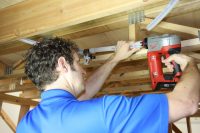
Residential plumbing and HVAC installers take note: you can pipe an entire home with the durability, flexibility and cost-effectiveness of PEX — for plumbing, fire sprinkler systems and radiant floor heating. Here’s how… PEX plumbing With more new homes plumbed with PEX than copper and CPVC combined, you’re probably already aware of the benefits of Read more
Residential plumbing and HVAC installers take note: you can pipe an entire home with the durability, flexibility and cost-effectiveness of PEX — for plumbing, fire sprinkler systems and radiant floor heating.
Here’s how…
PEX plumbing
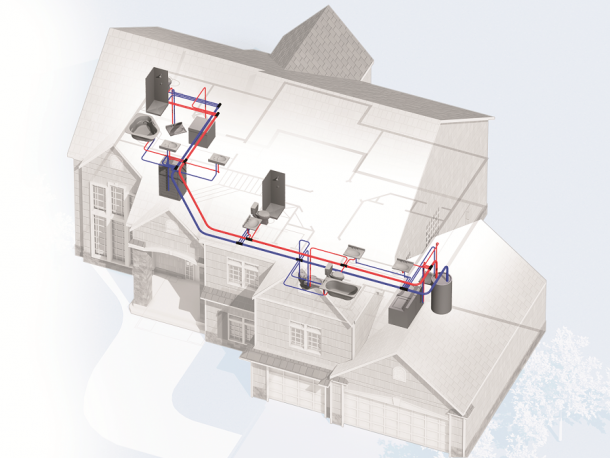 With more new homes plumbed with PEX than copper and CPVC combined, you’re probably already aware of the benefits of plumbing with PEX. However, you may not know about a newer, smarter way to install a PEX plumbing system that goes in faster, uses less materials, requires fewer connections and minimizes your liability.
With more new homes plumbed with PEX than copper and CPVC combined, you’re probably already aware of the benefits of plumbing with PEX. However, you may not know about a newer, smarter way to install a PEX plumbing system that goes in faster, uses less materials, requires fewer connections and minimizes your liability.
This innovative design is called Logic plumbing.
The Logic approach uses the flexibility of PEX pipe to minimize connections and reduce potential leak points while also incorporating multiport tees located near fixture groupings to limit the amount of pipe and connections needed.
What’s a multiport tee, you ask? It’s essentially a bunch of tees all molded together to create one long tee with multiple outlets. This design greatly reduces the number of fittings and connections needed to plumb a home (think: reduced materials cost and labor time).
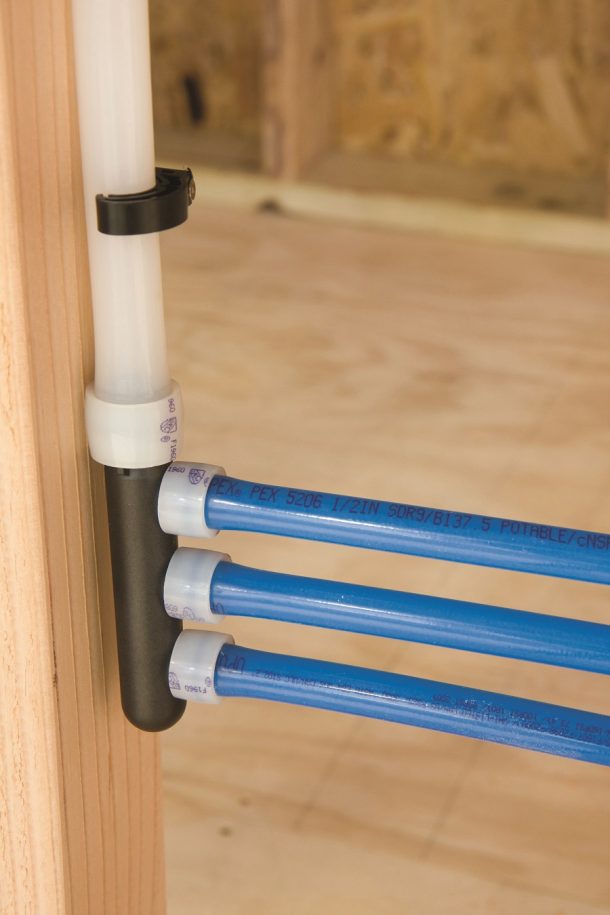 Here’s an example of how a multiport tee saves installation time and materials: a flow-through multiport tee with six outlets has eight connections (six connections for the ports, a main flow-through inlet and a main flow-through outlet). Six regular tees, on the other hand, have a whopping 18 connections. That’s an increase of more than double the connections — and double the installation time.
Here’s an example of how a multiport tee saves installation time and materials: a flow-through multiport tee with six outlets has eight connections (six connections for the ports, a main flow-through inlet and a main flow-through outlet). Six regular tees, on the other hand, have a whopping 18 connections. That’s an increase of more than double the connections — and double the installation time.
Best of all, multiport tees are not considered manifolds, so they can be installed behind walls without the need for an access panel. Double win, there!
For a Logic layout, a main line connects to a multiport tee with distribution lines going out from the multiport to provide water to all fixtures in a single or adjacent grouping. This design uses significantly less pipe than a home-run layout, with just a few more connections. Plus, it requires considerably fewer connections compared to a trunk-and-branch installation.
For example, a 2,300-square-foot, two-story home using a Logic design requires only 637 feet of pipe while a home-run system uses 1,515 feet of pipe. And, while it’s true a Logic installation uses slightly more connections than a home-run layout (59 vs. 48 in the 2,300-square-foot, two-story home example), the amount of pipe savings is significantly more beneficial with the labor and material savings you get with less pipe to install.
A Logic layout also installs much faster compared to a trunk-and-branch system due to the vast reduction in connections. With the two-story home example, a Logic layout uses a mere 16 fittings and 59 connections compared to a whopping 96 fittings and 165 connections for trunk and branch.
PEX multipurpose fire sprinkler systems
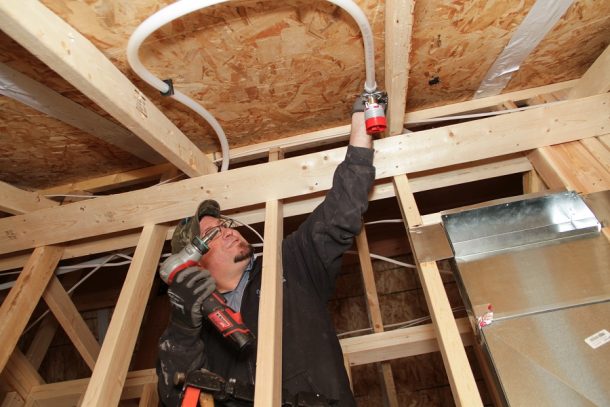 If you’re a licensed plumber who wants to add an additional service to your offering, check out PEX multipurpose fire sprinkler systems. These systems combine the fire sprinklers with a home’s cold-water plumbing. It’s genius!
If you’re a licensed plumber who wants to add an additional service to your offering, check out PEX multipurpose fire sprinkler systems. These systems combine the fire sprinklers with a home’s cold-water plumbing. It’s genius!
Installation is remarkably easy — the sprinkler is essentially just another fixture to tie into the plumbing line. For most contractors who already install PEX plumbing systems and have the tools, knowledge and, most importantly, the relationships with the home builders, this is a slam dunk.
Depending on the jurisdiction, multipurpose systems typically don’t need check valves or backflow preventers, and because they combine with the potable plumbing, they don’t use antifreeze, so all those added costs are eliminated.
To get started in most jurisdictions, licensed plumbers just need the appropriate training and a quality design that meets the NFPA 13D standard requirements for home fire sprinkler systems.
If you’re interested in learning more, email me at kim.bliss@uponor.com, and I can get you all the information you need to add this profitable new service to your business.
PEX hydronic radiant floor heating
There’s nothing like the comfort of radiant floor heating — ask anyone who has experienced it. And, homeowners will pay nicely for a quality radiant floor heating system, so there is definitely income potential if you can learn to do it right.
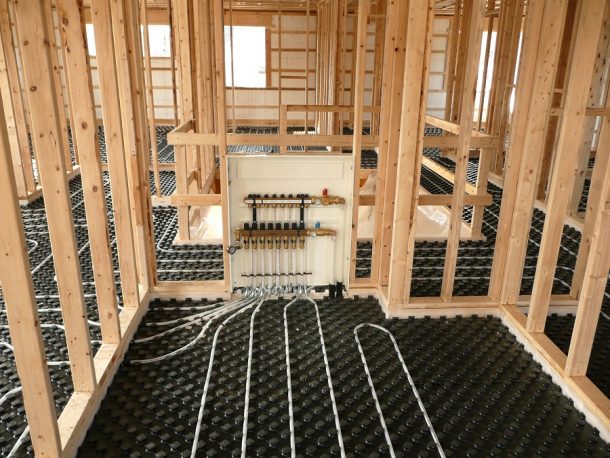 That said, with radiant floor heating, there’s a little more to learn. But, like fire sprinkler systems, starting with a proper design is key. If your design is wrong in the beginning, there’s not much you can do to fix the system once it’s installed.
That said, with radiant floor heating, there’s a little more to learn. But, like fire sprinkler systems, starting with a proper design is key. If your design is wrong in the beginning, there’s not much you can do to fix the system once it’s installed.
Take advantage of the radiant design services many PEX manufacturers offer to guide you through the process. There are several design factors to know, including floor R-values, heat-loss calculations, pipe sizing, loop lengths, pump sizing, manifold types and more.
Once you learn the basics of radiant design and get a few small jobs under your belt, you have the potential to take your expertise to the next level with bigger, more profitable projects. But again, be sure to get the proper design and training before you tackle a radiant project. It will be well worth it in the long run.
To get a jumpstart on all things radiant, visit the following industry websites at radiantprofessionalsalliance.org, healthyheating.com or heatinghelp.com.

Kim Bliss is the content development manager at Uponor. She can be reached at kim.bliss@uponor.com.

When it comes to home improvements, homeowners often have increasing the property’s value in mind. But before they start knocking down walls or changing the plumbing, they turn to tradespeople who can give advice and also work on home improvement projects. That’s where you come in. Being updated on the latest home improvement projects provides Read more
When it comes to home improvements, homeowners often have increasing the property’s value in mind. But before they start knocking down walls or changing the plumbing, they turn to tradespeople who can give advice and also work on home improvement projects. That’s where you come in.

Being updated on the latest home improvement projects provides a competitive advantage to any tradesperson. Homeowners want trade professionals who are familiar with the latest trends in home improvement and who have the skills to work on them. To get you started, here are the top home improvement projects that increase a property’s value.
1. Urgent repair inspection
Not all home improvement projects involve a complete overhaul of one area of the home. Some homes may just need a quick inspection. There are areas in the home that are seldom seen by homeowners but can hide problems that can negatively impact the value of a home. These problems are usually discovered during an appraisal and can significantly reduce the price that sellers will receive. The longer homeowners put off these urgent repairs, the more expensive the cost of repair will be.
These problems can be easily noticed by a tradesperson’s trained eye. A tradesperson will be able to pinpoint the signs of a termite infestation, outdated plumbing or electrical system, or deteriorating walls and roofs.
2. Interior and exterior paint job
When done correctly, a fresh coat of paint for the house is one of the most cost-effective home improvement projects. Since paint is relatively inexpensive, having a newly painted home gives a significant return on investment.
There are several areas that benefit from a new coat of paint. The front door and exterior walls are some of the first things a potential buyer sees and a new paint job can boost a home’s curb appeal. Kitchen cupboards and cabinets may look a little dated and could use a new color. Painting the house trims may not require much effort, but the right color can accentuate the whole home.
3. Updated plumbing system
Plumbing is the lifeblood of a home and thus, the value of a home can increase significantly with an updated plumbing system.
There are several ways tradespeople can help increase a property’s value with plumbing. Most home improvement projects involve the installation of new bathtubs, toilets and sinks. A new set of plumbing work hand in hand with this improvement. New plumbing that includes a water conservation feature is a huge plus for potential buyers.
Another way to improve the home’s value is through a drain replacement. A lot of things get stuck in the drain, including hair, food debris, and grime from dirty plates. A proactive repair and replacement of drains will translate to more comfortable living and increase in home value.
Finally, tradespeople may suggest the installation of an efficient water heater. No one wants to be stuck without hot water to warm up. Thus, it is vital to all homes that a water heater be installed or an old one updated.
4. Updated electrical system
Modern lifestyle demands an up-to-date electrical system. No potential home buyer would want to live in a home with not enough sockets for gadgets and appliances. If the electrical system is lacking, the buyer’s agent may negotiate a lower price or, worse, they may not take the home into consideration.
Some of the most common electrical updates include a fuse box or breaker panel replacement. Older homes may not be able to handle current technology’s electricity needs and may overheat easily and potentially cause a fire. Installing more power outlets is another option. To add value, tradespeople may suggest the addition of childproof power outlets that are appealing to families with children.
Most of these home improvement projects won’t break the bank, but a tradesperson’s experience and expertise can go a long way in increasing a home’s value. Be updated with the latest trends in home improvement to become a valuable asset to current and future clients.
 Chris Woodard is the co-founder of Handle, a software company that helps contractors, subcontractors and materials suppliers secure their lien rights and get paid faster by automating the collection process of unpaid construction invoices.
Chris Woodard is the co-founder of Handle, a software company that helps contractors, subcontractors and materials suppliers secure their lien rights and get paid faster by automating the collection process of unpaid construction invoices.

The term “duct tape” is misleading in that it’s not just one kind of tape (and, ironically, the majority aren’t recommended for HVAC systems). The term generally applies to a classification of pressure-sensitive tapes constructed in three layers: polyethylene (plastic), scrim (mesh fabric) and rubberized adhesive. But the quality, thickness (measured in mils — 1 Read more
 The term “duct tape” is misleading in that it’s not just one kind of tape (and, ironically, the majority aren’t recommended for HVAC systems). The term generally applies to a classification of pressure-sensitive tapes constructed in three layers: polyethylene (plastic), scrim (mesh fabric) and rubberized adhesive. But the quality, thickness (measured in mils — 1 mil = 1/1,000 in.), adhesion level and tensile strength vary widely, as do the specific recommended uses for each sub-category. Knowing which tapes to grab for which jobs will ensure your fix doesn’t fail and can save you time, money and a lot of space in your toolbox. Here’s a rundown.
The term “duct tape” is misleading in that it’s not just one kind of tape (and, ironically, the majority aren’t recommended for HVAC systems). The term generally applies to a classification of pressure-sensitive tapes constructed in three layers: polyethylene (plastic), scrim (mesh fabric) and rubberized adhesive. But the quality, thickness (measured in mils — 1 mil = 1/1,000 in.), adhesion level and tensile strength vary widely, as do the specific recommended uses for each sub-category. Knowing which tapes to grab for which jobs will ensure your fix doesn’t fail and can save you time, money and a lot of space in your toolbox. Here’s a rundown.
General Purpose Duct Tapes
Typical Thickness: 6-9 mils
This category covers a range of duct tapes, from the DIY junk-drawer tool for everyday household repairs to pro grade duct tapes that offer slightly thicker polyethylene, stronger adhesive qualities and, in some cases, waterproof backing. General purpose utility tapes have excellent bang for your buck and offer basic performance levels for jobs around the house (like sealing boxes, patching a grill cover or mending a plastic garden tool) or light duty pro applications in which an abundance of tape will be used and discarded in a short time (like hanging poly-sheeting or moisture barriers and bundling jobsite materials to be scrapped). Manufactured in a wide array of colors, they can also come in handy for labeling and color-coding. Because these tapes generally aren’t designed to stick to rough surfaces or withstand extreme fluctuations in temperatures, they’re best in lower-demand applications when you need a lot of tape at a value price. Bottom line: Handy for DIY home projects or light duty patching and bundling for pros on the job site.
Heavy Duty Duct Tapes
Typical Thickness: 10-17 mils
Unlike general purpose tapes, heavy duty duct tapes are formulated with superior adhesive, extra-thick polyethylene and an interwoven fabric scrim that has high tensile strength—but they’re still easy enough to tear by hand, which makes them ideal for fast repairs on the job. They can adhere to a variety of rough (and in some cases dirty) surfaces like brick, concrete, metal, wood and vinyl siding without the corners peeling up. Many offer UV resistance so that sunlight won’t impact their performance over time, and they can stand up to extreme temperature ranges and weather conditions. These are aggressive, highly versatile tapes for on-the-job tasks like attaching plastic sheeting to exterior surfaces, securing power cables and other tripping hazards on dirty floors or bundling construction materials. As a bonus, they can save the day in unexpected worksite mishaps — mending a broken tool handle, sealing a cracked wet/dry vacuum cleaner hose, or even patching a hole in your work boot or a torn truck seat. Bottom line: Every tradesperson should keep at least one roll of heavy duty duct tape in the toolbox — and multiple widths or colors won’t hurt.
Clear Repair Tapes
Typical Thickness: Approx. 7 mils
Clear repair tapes are not technically duct tapes in construction, but they offer similar performance and application, so it’s natural to compare them. Plus, they’re valuable tools for pros. Designed primarily for non-porous surfaces like glass, fiberglass or plastic, these tapes have long-lasting, airtight holding power, are waterproof and UV-resistant and, most importantly, allow the surface underneath to show through. That makes them ideal for repairing cracked cell phones screens, skylights, windows, mirrors and headlights. Bottom line: Your go-to tape for airtight, waterproof repairs on any surface that needs to be seen.
Structural Grade Duct Tapes
Typical Thickness: Approx. 17 mils
This is a relatively new category in tape technology. Super-aggressive adhesion and extremely high tensile strength make tapes like this less a tool for mending and patching and rather a quick engineering solution. Structural grade duct tapes are for projects that require intense strength, durability and holding power: think hoisting a heavy tool bucket up scaffolding, towing heavy construction materials short distances, or strapping and securing a heavy tool or appliance for transport. Currently, only one product exists in this category—T-Rex® Brute Force™. One loop of it can hold more than 700 pounds (yes, 700), making it the strongest duct tape on the market. It’s so strong you can’t tear it by hand. For some jobs, it’s even strong enough to take the place of rope or chain (and a roll of Brute Force is significantly lighter and more compact). Bottom line: Job requires a rope or chain? Consider a roll of Brute Force instead.

Steven Wagner is an eight-year veteran of ShurTech® Brands, Wagner currently serves as Category Manager for T-REX® and DIY Tapes. He has played an integral role in the development of the T-Rex® tape brand and has spearheaded advancements in new and innovative tape solutions for the contractor and residential markets. Wagner holds a bachelor’s degree from Capital University and a master’s degree from the University of Akron.
